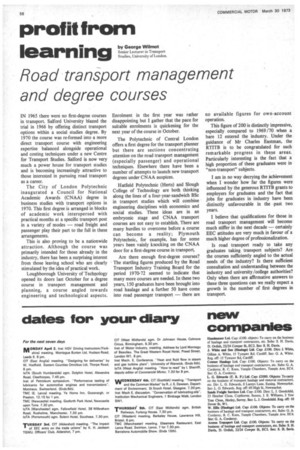profit from
Page 58

If you've noticed an error in this article please click here to report it so we can fix it.
learnin by George Wilmot
Senior Lecturer in Transport Studies, University of London.
Road transport management and degree courses
IN 1965 there were no first-degree courses in transport. Salford University blazed the trial in 1966 by offering distinct transport options within a social studies degree. By 1970 the course was re-formed into a more direct transport course with engineering expertise balanced alongside operational and costing techniques under a new Centre for Transport Studies. Salford is now very much a power house for transport studies and is becoming increasingly attractive to those interested in pursuing road transport as a career.
The City of London Polytechnic inaugurated a Council for National Academic Awards (CNAA) degree in business studies with transport options in 1970. This first degree is arranged in blocks of academic work interspersed with practical months at a specific transport post in a variety of modes road freight and passenger play their part to the full in these arrangements.
This is also proving to be a nationwide attraction. Although the course was primarily intended for those already in the industry, there has been a surprising interest from those leaving school who are clearly stimulated by the idea of practical work.
Loughborough University of Technology opened its doors last October for a degree course in transport management and planning, a course angled towards engineering and technological aspects. Enrolment in the first year was rather disappointing but I gather that the pace for suitable enrolments is quickening for the next year of the course in October.
The Polytechnic of Central London offers a first degree for the transport planner but there are sections concentrating attention on the road transport management (especially passenger) and operational techniques. Elsewhere there have been a number of attempts to launch new transport degrees under CNAA auspices.
Hatfield Polytechnic (Herts) and Slough College of Technology are both thinking along the lines of a four-year-sandwich BSc in transport studies which will combine engineering disciplines with economics and social studies. These ideas are in an embryonic stage and CNAA transport courses are not easy to establish. There are many hurdles to overcome before a course can become a reality; Plymouth Polytechnic, for example, has for some years been vainly knocking on the CNAA door for a first-degree course in transport,.
Are there enough first-degree courses? The startling figures produced by the Road Transport Industry Training Board for the period 1970-72 seemed to indicate that many more courses are needed. In these two years, 150 graduates have been brought into road haulage and a further 50 have come into road passenger transport there are no available figures for own-account operation.
This figure of 200 is distinctly impressive, especially compared to 1969/70 when a bare 12 entered the industry. Under the guidance of Mr Charles Eastman, the RTITB is to be congratulated for such remarkable progress in these areas. Particularly interesting is the fact that a high proportion of these graduates were in "non-transport" subjects.
I am in no way decrying the achievement when I wonder how far the figures were influenced by the generous RTITB grants to employers for graduates and the fact that jobs for graduates in industry have been distinctly unfavourable in the past two years.
I believe that qualifications for those in road transport management will become much stiffer in the next decade certainly EEC attitudes are very much in favour of a much higher degree of professionalization.
Is road transport ready to take any graduates taking transport subjects? Are the courses sufficiently angled to the actual needs of the industry? Is there sufficient consultation and understanding between the industry and university/college authorities? Only when there are affirmative answers to these three questions can we really expect a growth in the number of first degrees in transport.










































































































